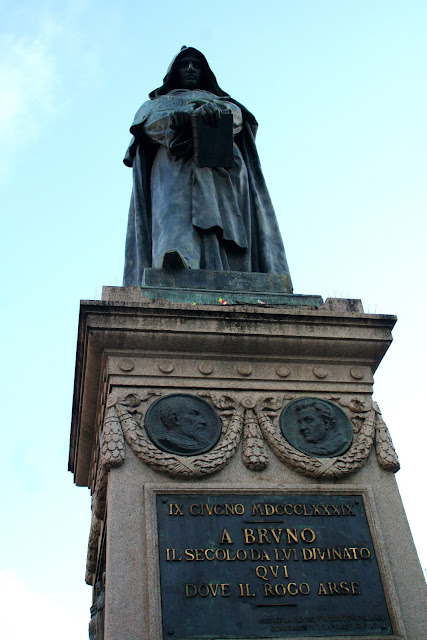In the Dominican Monastery, many esoteric books were deemed to have been written by "heretics" and subsequently banned. It was considered a serious crime to read the material, even if one completely disagreed with its contents. Bruno was very interested in this material and read books of this nature in secret while in the bathroom stall. Eventually, Bruno was discovered and fled the monastery. He traveled to many intellectual centers located in northern Italy, southern France, Padua, Milan, and Geneva.
By 1581, Bruno was in Paris and had developed a firm belief in the philosophy of hermeticism. While in Paris, he developed a camaraderie with the French king Henry III. Henry III was Catholic, but also had deep curiosity of esoteric teachings. Two years later, Bruno moved to London with Henry III's new ambassador to Queen Elizabeth I's court. Some speculate that Bruno was in contact with John Dee, consultant to Queen Elizabeth I who studied Hermetic philosophy.
Bruno was a master in the art of training the memory. Instead of using the mind to simply record information, he used talismanic principles to induce information. Bruno was even summoned to Rome to demonstrate his mastery to the Pope. Bruno had many areas of study, including scientific developments. He understood that human cells are perpetually replaced during life. Some academic writers believe Bruno's theories regarding the structure of matter could be a foundation for atomic theory.
Bruno believed that humans were not the center of the universe and that life existed outside of the earth. His theories explaining the nature of existence led to his murder on Ash Wednesday in 1600. On February 17 (today), Bruno was burnt at the stake for heresy. The Catholic church used "Spaccio de la Bestia Trionfante" or "Expulsion of the Triumphant Beast" as the primary support of Bruno's heresy. This is a literary work by Bruno from 1584 that was viewed by the Catholic church as an attack, and included references to Egyptian religion, Hermeticism, astrology, magic, and classical Greek mythology. In this text, Bruno reproduces ideas from an older Hermetic text called "Asclepius". Here is a translated excerpt from Bruno's text in reference to the lament of Asclepius:
“Do you know, Asclepius, that Egypt is an image of Heaven, or to speak more exactly, in Egypt all the operations of the powers which rule and work in Heaven are present in the Earth below? In fact it should be said that the whole Cosmos dwells in this our land as in a sanctuary.
And yet, since it is fitting that wise men should have knowledge of all events before they come to pass, you must not be left in ignorance of what I will now tell you.
No word of reverence
or piety, no utterance worthy of heaven, will be heard or believed.
Bruno believed the magical religion of ancient Egypt was corrupted by the the Christian religion. He claimed that "triumphant beast" was a metaphor for human voices, but many individuals from the Inquisition saw this as a reference to the pope of the time. Bruno traveled more to France and Germany to expose the dangers of the Catholic power. However, he returned to Italy in 1591 upon invitation to visit Venice. Ultimately, he was reported to the Inquisition and arrested in 1592. Bruno was held in prison for eight years before he was burnt at the stake with his tongue tied. He was viewed as the diabolically inspired magician who sought the destruction of God's own holy church. Some believe that Bruno had made plans prior to his capture to continue his underground Hermetic movement in the form of a secret society.
In 1889, a statue of Giordano Bruno was erected in Rome at Campo de Fiori, the site where Bruno was burnt at the stake. The statue was erected by Ettore Ferrari, the Grand Master of a Masonic jurisdiction in Italy known as Grande Oriente d'Italia. Upon the unveiling of the statue, a radical politician named Giovanni Bovio gave a speech encircled by a multitude of Masonic flags. Today, many atheists and freethinkers gather around this site on February 17th in commemoration of Giordano Bruno and celebrate the freedom of ideas.







No comments:
Post a Comment